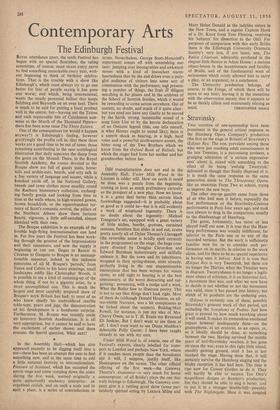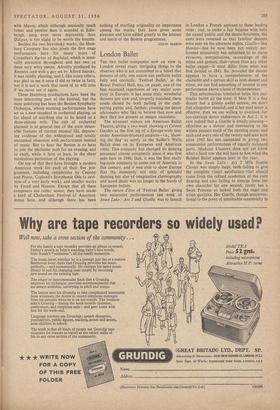Stravinsky
Two varieties of one-upmanship have been prominent in the general critical response to the Hamburg Opera Company's production (the first on the stage in Britain) of Stravinsky's (Edipus Rex. The one, prevalent among those who were just reaching adult consciousness in the late Twenties, is a patronising coolness, a grudging admission of 'a certain impressive- ness' about it, mixed with something to the effect of its being 'awfully Twentyish,' delivered as though that finally disposed of it. It is much the same response as the same generation made to The Threepenny Opera, like an uncertain Form Two at school, trying to impress the new boys.
The other one-up gambit came from those of us who had seen it before, especially the first performance or the Stravinsky-Cocteau performance in Paris four years ago, and took care always to drag in the comparison, usually to the disadvantage of Hamburg.
The game, fortunately, has more or less played itself out now. It is true that the Ham- burg performance was vocally indifferent, far inferior to the Paris one or to any of the recorded versions. But the work is sufficiently familiar now for us to consider each per- formance on its merits, in relation to the work alone, and for there to be no special superiority in having seen it before. And it is true that CEdiptis Rex is very Twentyish, but these are no longer the Thirties, when the Twenties were in disgrace. Twcntyishness is no longer a legiti- mate object of criticism, it is an historical fact, a movement that was, and what we now have to decide is not whether or not the movement was valid, since it has passed into history, but which of its products are the enduring ones.
(Edipus is certainly one of these, possibly Stravinsky's greatest work of that period, not excluding the Symphony of Psalms. Just how great is proved by how much knocking about it will stand. It makes its tremendous emotional impact however inadequately done—on the gramophone, as an oratorio, as an opera, or, as it ideally should be done, as something . between the two. Having survived the middle years of anti-Stravinsky reaction it has gone on since the war, even in this tight little island, steadily gaining ground, until it has at last reached the stage. Having done that, it will certainly survive the Hamburg singing and the bitchy reception it has had here. The time is ripe now for Covent Garden to do it. They will hardly be able to surpass Teo Otto's magnificent designs or Rennert's production, but they should be able to sing it better, and to put it in a stronger double-bill—possibly with The Nightingale. Here it was coupled with Mavra, which although musically much better and prettier than it sounded at Edin- burgh, sung even more deplorably than CEdipus, is too slight to be worth the trouble.
Besides the two Stravinsky works, the Ham- burg Company has also given the first stage performance here for many years of Cornelius's Barber of Baghdad, which is musi- cally attractive throughout and has two or three very witty pieces. Adroitly produced by Rennert, and with a gay set by Alfred Siercke, it was mildly pleasing, and I, like many others, was glad to see it once (I did so twice in fact), but it is not a work that most of us will miss if we never see it again.
These Hamburg productions have been the most interesting part of the festival, but the mos.t satisfying has been the Boston Symphony Orchestra, whose stunning performances have set us a new standard in orchestral playing, as far ahead of anything else to be heard as a three-minute mile. The cult of orchestral glamour is in general one of the most detest- able features of current musical life, depress- ing evidence of the widespread and totally unmusical obsession with performance instead of music. But to hear the Boston is to have to join the philistine mob for an evening, and to exult, while it lasts at least, in the sheer miraculous perfection of the playing.
On top of this they have brought a modern American work for each of their five pro- grammes, including symphonies by Creston and Piston, Copland's Symphonic Ode (a revi- sion of a very early work), and smaller works by Freed and Hanson. Except that all these composers are rather senior, they have made a kind of Cheltenham Festival of American music here, and although there has been
nothing of startling originality or importance among the works, they have given some pleasure and have added greatly to the interest and merit of the Boston programmes.
COLIN MASON



































 Previous page
Previous page